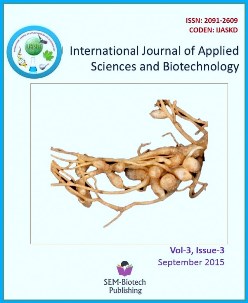Enzymatic Screening and Molecular Characterization of Thermophilic Bacterial Strains Isolated from Hotspring of Tatopani, Bhurung, Nepal
DOI:
https://doi.org/10.3126/ijasbt.v3i3.12724Keywords:
Thermophilic Bacteria, Thermostable exozymes, Sequencing, Phylogenetic analysis, G C contentAbstract
Background and Aim: In Nepal not much of study of Thermophilic area and Thermophiles have been done. Thermophilic bacteria are less studied but are important group of microorganisms due to their ability to produce industrially important enzymes. Methods: In this study, thermophilic bacteria were isolated from hot spring of Bhurung, Nepal. Wide range of bacteria that could grow at high temperatures and tolerate extreme temperature were characterized by morphology, biochemistry and sequencing of its 16S rRNA gene sequence. The isolates were screened for production of extracellular enzymes like protease, amylase, lipase, cellulase, caseinase, pectinase and xylanase activity. Phylogenetic tree construction and G+C content evaluation of the isolate was also studied.
Results: 15 isolates with ability to tolerate high temperatures were identified as Bacillus sp. by morphology, biochemistry and sequencing of its 16S rRNA gene sequence. BLAST search analysis of the sequence was performed and result showed maximum identity (99% similarity) with Bacillus licheniformis, Bacillus subtilis and Bacillus pumilus. Isolated strains exhibited considerable amount of extracellular exozymes activity. Phylogenetic analysis of the isolates revealed the relatedness among the species. The G+C content of each species was also evaluated and was found to be in range of 54.87 to 55.54%.
Conclusion: The study of isolates confirmed that the isolated Bacillus sp. to be a true thermophile and could be a source of various thermostable exozymes which can be exploited for pharmaceutical and industrials applications. Much detailed study of the isolates can
Int J Appl Sci Biotechnol, Vol 3(3): 392-397




